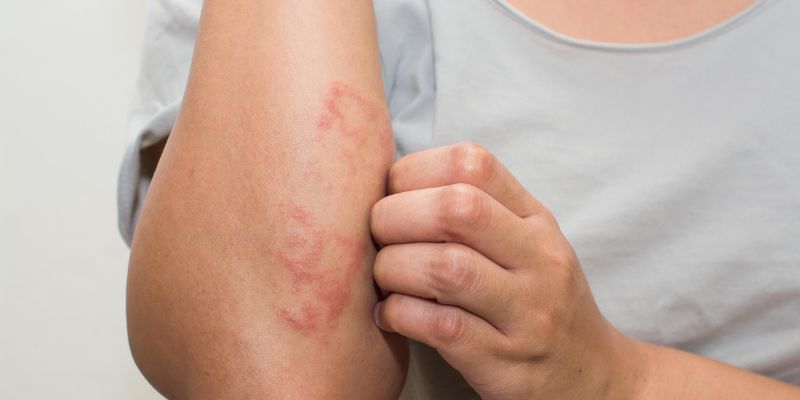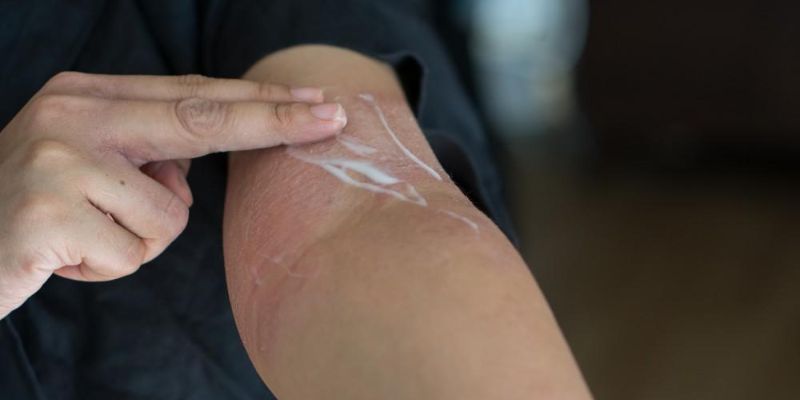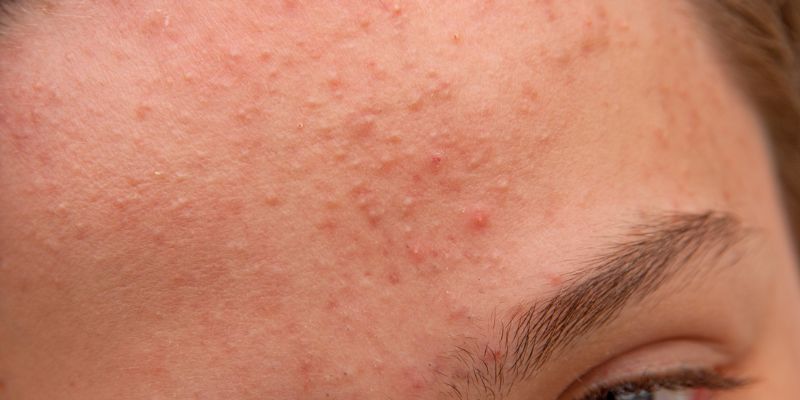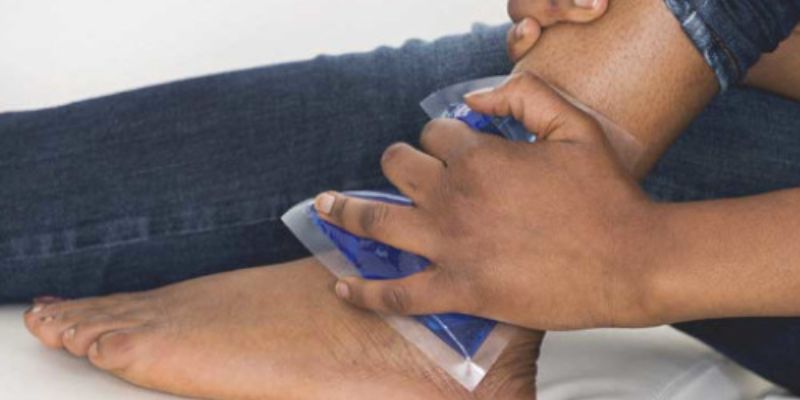Does Eczema Go Away
Feb 05, 2024 By Madison Evans
Do you have eczema and are wondering if it will ever go away? You're not alone. Eczema, a skin condition that causes itchy red patches or blisters, affects children and adults of any age. While treatments for managing eczema symptoms are available, many people wonder whether there's a way to permanently eliminate this condition.
In this blog post, we look in-depth at how long eczema may last and what options could be available for getting rid of it once and for all. Read on to learn more about the longevity of this difficult skincare issue!
Eczema Stages

Eczema is a skin condition characterized by itchy, red patches or blisters that can cause discomfort and pain. It affects both children and adults of any age. Let's look at the stages of eczema and explore what options could be available for getting rid of it.
Chronic Eczema
The chronic stage of eczema refers to rashes that last three or more months. Symptoms include itchiness, cracking, discolored or dark skin, lichenification (thick, leathery areas caused by long-term scratching), and firm bumps.
It is important to seek medical advice if your eczema persists for more than three months, as the condition could become severe or cause further damage to the skin.
Acute Eczema
The acute stage of eczema is a rash that has just begun or is restarting after remission. Symptoms include extreme itchiness, red rash, bumps or vesicles (fluid-filled blisters), oozing skin, pain and tenderness, and swelling.
This type of eczema can be particularly uncomfortable, and it is important to treat it quickly with medication prescribed by your doctor.
Subacute Eczema
The subacute stage of eczema may begin without an acute phase and is characterized by dry, flaky, and scaly skin that may also be cracked. There will likely be less intense itchiness than in the acute phase, but a red rash and burning or stinging sensations can still occur.
Eczema Treatment

Currently, eczema has no cure. While eczema has no cure, treatments are available to help manage symptoms and reduce flare-ups. Some treatments are as follows:
Avoiding Triggers
The first step in managing eczema is identifying and avoiding your triggers. Common triggers include dust mites, pollen, pet dander, certain soaps and detergents, smoke, stress, and sweating.
Keeping track of when you experience flares can help you determine what may be causing them. Once identified, you can work with your doctor on a plan to avoid those triggers and reduce your symptoms.
Moisturizer
Moisturizers are an essential part of any eczema treatment plan. Moisturizers help seal in moisture which can help prevent the skin from becoming dry and irritated. Look for moisturizers that contain ceramides, which are especially effective for managing eczema flares.
Hydrocortisone Cream & Topical Steroids
For more severe cases of eczema, topical steroids like hydrocortisone cream may be recommended to reduce inflammation and itching. These medications should be used cautiously, as overuse could lead to skin thinning or potential side effects such as redness, burning, or stinging.
Topical Calcineurin Inhibitors & JAK (Janus kinase) Inhibitors
Another type of eczema treatment is topical calcineurin inhibitors (TCIs). These creams or ointments block a certain protein to reduce inflammation and itching. While effective, TCIs should be used cautiously due to potential side effects such as skin thinning and increased risk for infection.
JAK (Janus kinase) inhibitors are newer medications sometimes recommended for managing severe eczema. Like TCIs, these medications can help reduce inflammation and itching, but they do not have the same side effects as steroids or other medications may.
Phototherapy & Wet Wrap Therapy
In some cases, phototherapy (light therapy) may be used to treat eczema. This involves exposing the skin to ultraviolet radiation in a controlled setting. Phototherapy can help reduce inflammation and itchiness in some people with severe eczema.
Wet wrap therapy is sometimes recommended as an adjunct treatment for more intense eczema flares. During this treatment, your skin is wrapped in damp cloths or bandages, which helps relieve itching and improve hydration.
Other Treatments & Lifestyle Changes
Other treatments are available for managing eczema symptoms, such as oral steroids or antibiotics for treating any infections that may have developed due to excessive scratching of the affected areas.
Additionally, lifestyle changes such as taking lukewarm baths, wearing loose-fitting clothing, and using humidifiers can help reduce flares.
What Triggers Eczema Flare-Ups and How Long Does Flare Up Lasts
Medical professionals are still researching what causes eczema and flare-up, but certain triggers have been identified. Triggers can be environmental or genetic; stress or anxiety can cause a flare-up.
Common environmental triggers for eczema include exposure to certain metals, cigarette smoke, allergens such as pollen or pet dander, extreme weather temperatures, high altitudes, hot water, chlorine, certain chemicals such as bacitracin and formaldehyde, latex and polyester clothing or wool fabric.
Additionally, viruses like colds or flu may also trigger an eczema flare-up. It's important to note that everyone is different, so you may need to journal your experiences to identify which triggers may cause a flare-up in your case.
Eczema lasts about two to three weeks if treated or could be indefinite in some cases. If the trigger can not be identified and a person continues to be exposed, this may lengthen the flare-up time. Chronic eczema can cause persistent, long-term symptoms that do not go away even with treatment.
Preventing Flare-Ups
If you suffer from eczema, flare-ups can be an unpleasant part of life. Taking proactive steps to reduce exposures and triggers of your skin condition can help prevent further flare-ups, allowing you to enjoy a more comfortable life.
Identifying Triggers
The most important step in preventing eczema flare-ups is identifying the things that trigger them. While it isn't always possible to avoid every single trigger, understanding which ones cause a reaction helps you limit your exposure.
Common triggers include environmental factors such as temperature and humidity changes, certain fabrics and detergents, soaps and body washes, fragrances and perfumes, and dust mites. Paying attention to what your skin reacts to can help you determine the best ways to protect yourself from further flare-ups.
Minimizing Exposure
Once you've identified your triggers, it's time to focus on minimizing your exposure. If certain fragrances or detergents cause a reaction, switch to using products without these components.
Wear loose clothing made of natural fabrics such as cotton that won't irritate your skin, and take lukewarm baths instead of hot showers.
Ensure airborne allergens don't trigger a reaction by keeping windows closed during high pollen seasons and using air purifiers in your home if necessary. Additionally, it's important to keep stress levels under control, as this can also lead to flare-ups.
Regular Care and Treatment
In addition to identifying triggers and avoiding them whenever possible, the best way to prevent eczema flare-ups is to stick to a regular skincare routine and follow your healthcare provider's recommended treatment plan.
This might include regular moisturizing, topical medications or creams prescribed by your doctor, or taking oral antihistamines if necessary. Taking good care of yourself can significantly reduce the frequency and severity of flare-ups.
If you're struggling with eczema flare-ups, don't be discouraged! Properly understanding and managing your condition makes it possible to enjoy a life free from uncomfortable and persistent flare-ups.
FAQs
Will eczema go away by itself?
In some cases, eczema may go away without treatment or with the help of lifestyle changes and home remedies. However, in other cases, following a treatment plan prescribed by your healthcare provider to reduce symptoms and achieve lasting relief may be necessary.
Is there a permanent cure for eczema?
Currently, eczema has no cure, but treatments can help manage symptoms. Certain medications, such as topical steroids or oral antibiotics, may be prescribed to reduce inflammation and itching, depending on the severity of your condition.
Can stress cause eczema flares?
Yes, stress can be a significant trigger for eczema flares. If you suffer from this skin condition, it's important to find ways to reduce or manage your stress levels to prevent flare-ups.
Conclusion
Eczema is a chronic skin condition that can cause pain and distress due to constant itching and irritation. However, with proper medical assistance and lifestyle adjustments, individuals affected by eczema can learn how to manage their symptoms and reduce the likelihood of having recurring flare-ups. While the answer to the question of 'Does Eczema Go Away?' ultimately remains no, understanding what triggers your flare-ups and implementing appropriate preventative measures can protect yourself to greatly minimize outbreaks.
-
 Nov 26, 2023
Nov 26, 2023Causes and Treatment of Closed Comedones
Struggling with acne can feel like an uphill battle. Learn more about this common skin condition, its causes, and treatments for closed comedones to get the clear skin you deserve.
-
 Dec 14, 2023
Dec 14, 2023Vitamin D vs. D3: What’s the Difference
Do you need clarification about the differences between Vitamin D and Vitamin D3? In this comprehensive guide, we'll explore why these two are important, their benefits, potential side effects from overexposure to each one - plus more!
-
 Nov 25, 2023
Nov 25, 2023How to Quickly Relieve Gout Pain
Looking for ways to manage gout pain? Learn about natural solutions, dietary changes, over-the-counter treatments, and lifestyle modifications that can help provide fast relief.
-
 Dec 13, 2023
Dec 13, 2023What Is Progressive Muscular Atrophy
This blog post explores the definition, symptoms, and treatments of progressive muscular atrophy. Discover what PMA is today to better understand your risk for muscle deterioration and how you can manage it.
